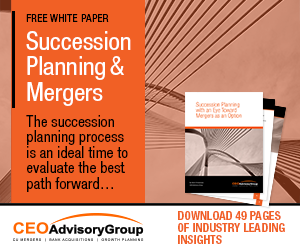CEO Perspective – Obstacles to Mergers
We’ve talked about the people or groups of people who are sometimes averse to considering a merger when a potential partner presents itself, but we haven’t really addressed the merger obstacles that often keep leaders from considering integrating another organization into their own practices. Let’s change that with this post.
CEO Advisory Group commissioned a survey in which credit union leaders were asked a number of questions, including which hurdles keep them from engaging in discussions about possible mergers. Armed with this information, we’ll dive into the merger obstacles leaders are most (and least) concerned with.
1. What will your role be after the merger?
One of the biggest things that holds leaders back from merging with other organizations is the uncertainty of what will come. What kind of role will existing executives have when they’re acquired by another organization? What kind of compensation will leaders and employees receive once the deal is done?
In fact, these two elements were the highest-rated merger concerns reported by respondents of CEO Advisory Group’s study. Almost half (49.3%) of respondents indicated the concern about CEOs’ and executive positions’ roles after the merger was at the forefront of their apprehension about such a transaction.
In a related category, 67.6% of respondents indicated that concern about compensation was either influential or very influential in their decisions to consider (or not consider) a potential merger.
2. How will your employees fare after the merger?
The third-most influential element of the merger concerns discussed in CEO Advisory Group’s survey related to worries about employees’ jobs. After all, a good credit union leader wants to ensure that the people under him or her will not only survive—but will thrive—in the scenario that plays out after two credit unions become one.
In fact, mergers can actually be in the best interest of employees for many reasons, such as:
- Higher salary opportunities
- Better, more efficient technology
- Specializations within their broader scopes of knowledge
- Larger footprints that might bring branches closer to employees’ homes
- Greater opportunities for advancement
Although nearly 90% of survey respondents indicated employees’ jobs were somewhat influential, influential, or very influential with regard to merger obstacles, it’s important for leaders to understand that—most of the time—the benefits to employees are significant where mergers are concerned.
3. Is contentment keeping you stagnant?
Coming in at fourth on the list was the fact that many leaders are content with the status quo and believe they’re doing well right now. While this may be the case, it doesn’t mean there aren’t opportunities for greater advancement, should the right credit union come along.
In terms of merger obstacles, it’s always best to consider the potential benefits and growth that could result from a partnership before you disregard possible suitors. However, nearly 66% of respondents to the survey indicated they’re content with the way things are currently going in their organizations and don’t see the need to consider mergers.
4. You’re not facing financial difficulties, so why bother with a merger consideration?
One-third of survey respondents indicated they aren’t interested in a merger because they’re not facing financial difficulties.
This is the wrong way to look at things because credit unions that are in financial trouble are less likely to attract high-quality suitors and may, in fact, lose have less negotiating power on the table. The right time to consider a merger is when your organization is financially healthy and has leverage on the negotiating table.
If you’d like to learn more about the merger obstacles that are holding credit union leaders back from making decisions that could ultimately enhance their organizations, download our white paper today.

 CEO Advisory Group
CEO Advisory Group
